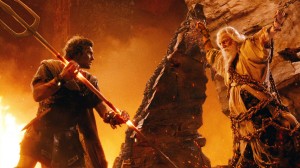Wrath of the Titans falls short of action potential
Greek mythology has three chief components: guys with mommy and daddy issues, guys with chips on their shoulders and guys who can’t resist a pretty face.
These standards have inspired some of the greatest works in literature but have also inspired a bunch of cheesy sword-and-sandal flicks. Wrath of the Titans, the sequel to the 2010 remake of Clash of the Titans (1981), falls into the latter.

Heroic tale · Though Wrath of the Titans is grandiose in theory, it fails to deliver enticing action sequences and is instead dull and lifeless. - Photo courtesy of Warner Bros. Pictures
Ten years after the events of Clash of the Titans, Perseus (Sam Worthington) is a single dad trying to raise his son Helius (John Bell) to be a respectable fisherman; viewers are left to assume his canonical firstborn son, Perseus, died of colic or something. Meanwhile, the gods are losing their powers as humans cease their worship, which makes it difficult for them to contain the imprisoned Titan Kronos.
Considering that Zeus (Liam Neeson) and his brothers overthrew Kronos — their father — in the first place, this is cause for concern.
Alas, family rivalries make children of us all. Ares (Édgar Ramírez) whines that his father Zeus favors his bastard son Perseus, while Hades (Ralph Fiennes) hates ruling the Underworld. Instead of teaming up to stop Kronos, Ares and Hades betray Zeus and transfer his powers to Kronos.
So it’s up to demigod Perseus to rescue his father from Tartarus and stop Granddaddy Kronos from destroying Greece. Of course, a hero’s journey would not be complete without an entourage, and Perseus teams up here with Poseidon’s lay-about demigod son Agenor (Toby Kebbell) and warrior-queen Andromeda (Rosamund Pike).
Mythology nerds might be feeling a prickle of apprehension about this. In traditional mythology, Agenor was a king of Tyre long before Zeus made whoopee with Perseus’ mom, and Andromeda was one of legend’s first damsels in distress. Canonical accuracy doesn’t get better than this.
As Perseus, Worthington has a heroic jawline — but that’s about it. Otherwise, he’s just a scruffy guy in a skirt. Pike and Kebbell try their best, but the Getty Villa’s museum cards have more character development than the film’s screenplay does.
The supporting cast, at least, adds a bit of spark. Fiennes crafts Hades as a mix of Voldemort and King John. He’s the only character who changes in the film, and thus is the most interesting. Bill Nighy appears all-too-briefly as a schizophrenic Hephaestus, and he’s much better comic relief than Kebbell as Agenor. And though the film strips Zeus of his pettiness and lechery, Neeson always has a commanding presence. Still, even good actors can’t do much with a bare-bones script.
The characters have legitimate grievances, which are all the kindling needed for interesting character interactions. As it is, though, the relationships are tepid. In mythology, Oedipus’ daddy issues lead to eye-gouging and unintentional incest. Here, Ares’ daddy issues lead to hissy fits and self-righteous fury. Horribleness can have its own kind of glory, but Wrath of the Titans is worse — it’s boring.
Wrath of the Titans’ trailers promised nonstop action and adventure. It might deliver in body, but a spirited reading of The Odyssey will have far more thrills than the film. Despite beautiful vistas and a $150-million budget, the action stays cold and anemic: A giant two-headed chimaera setting itself on fire is a dull affair, and the actual fight with Kronos was done far better in Star Wars.
At one point, the film shudders to life: Two gods put aside their differences and unleash a wave of divine wrath on their enemies. All too short, this scene stands above all the others. Why couldn’t the entire movie be about overpowered guys blowing things up? It worked fine in 300.
In that regard, the film had two possible paths. One could have focused on the pathos of Greek mythology — the human elements of gods and divine heroes that have so enriched historic literature. Exploring Hades’ resentment of Zeus, Ares’ hatred of his father’s bastard children and Kronos’ vengeance against his offspring could have made a rollicking and engaging film.
Or, had the film ditched these obligatory “character-building” scenes and focused on over-the-top fights and pulse-racing action, it could have been ridiculous popcorn fun — not a bad thing if done right, à la 300 and Hard Boiled.
Instead, the film tries to take the Lord of the Rings approach of strong characters and glorious action. Though the film’s cast is far more varied in ability, the action scenes are stiff and blurry and the run time is 99 minutes. Lord of the Rings, it is not.
Wrath of the Titans has an epic enough premise — Greek mythology remains with us to this day for a reason, in archetypes and cultural memes.
Bloated blockbusters, however, do nothing to make ancient heroes more appealing to the youngsters — or amuse their better-read parents.

I only liked this movie because Sam Worthington and Liam Neeson was in it.